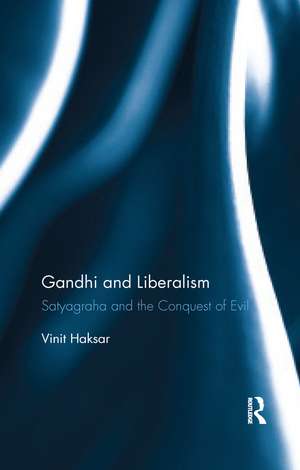Gandhi and Liberalism: Satyagraha and the Conquest of Evil
Autor Vinit Haksaren Limba Engleză Paperback – 28 mar 2019
This book will be essential for scholars and researchers in moral, legal and political philosophy, Gandhi studies, political science and South Asian studies.
| Toate formatele și edițiile | Preț | Express |
|---|---|---|
| Paperback (1) | 414.32 lei 6-8 săpt. | |
| Taylor & Francis – 28 mar 2019 | 414.32 lei 6-8 săpt. | |
| Hardback (1) | 899.96 lei 6-8 săpt. | |
| Taylor & Francis – 18 iul 2017 | 899.96 lei 6-8 săpt. |
Preț: 414.32 lei
Nou
Puncte Express: 621
Preț estimativ în valută:
79.28€ • 82.77$ • 65.61£
79.28€ • 82.77$ • 65.61£
Carte tipărită la comandă
Livrare economică 04-18 aprilie
Preluare comenzi: 021 569.72.76
Specificații
ISBN-13: 9780367277550
ISBN-10: 0367277557
Pagini: 282
Dimensiuni: 138 x 216 x 16 mm
Greutate: 0.41 kg
Ediția:1
Editura: Taylor & Francis
Colecția Routledge India
Locul publicării:Oxford, United Kingdom
ISBN-10: 0367277557
Pagini: 282
Dimensiuni: 138 x 216 x 16 mm
Greutate: 0.41 kg
Ediția:1
Editura: Taylor & Francis
Colecția Routledge India
Locul publicării:Oxford, United Kingdom
Public țintă
PostgraduateCuprins
Acknowledgements. Introduction PART ONE 1. Violence in a Spirit of Love: Gandhi and the Limits of Non-Violence 2. Necessary Evil: Justification, Excuse or Pardon 3. Indian Secularism and Religious Accommodation: Liberal Balancing and Diversity with Harmony PART TWO 4. Civil Disobedience as a Form of Address 5. Non-Co-operation and Coercion 6. The Right to Civil Disobedience 7. Conclusion. Appendix to Chapter One. Appendix to Chapter Three. Index
Notă biografică
Vinit Haksar has taught Philosophy at the Universities of Edinburgh, St Andrews and Oxford, UK. He is a Fellow of The Royal Society of Edinburgh and an Honorary Fellow, School of Philosophy, Psychology and Language Sciences, University of Edinburgh. He has held many visiting professorships including John Milton Scott Visiting Professorship, Queen’s University, Kingston, Canada, Dartmouth College, New Hampshire and Jawaharlal Nehru University, India. He has written several books including Equality, Liberty and Perfectionism (1979); Indivisible Selves and Moral Practice (1991); Rights, Communities and Disobedience (2001), and has published extensively in anthologies and international journals of philosophy, politics and law, apart from delivering many public lectures.
Recenzii
‘A very good book, very carefully thought out and explained, backed by lifetime's knowledge of India and contributions to political philosophy.’
Professor Sir Richard Sorabji, Honorary Fellow, Wolfson College, Oxford, UK
‘This unusual and exciting book makes a concerted attempt with clearly argued ideas to present both liberalism and Gandhi on issues such as civil disobedience and overcoming evil in society, and contributes to the present discussion in political theory by making some important corrections in the existing understanding of Gandhi.’
Professor A. Raghuramaraju, Department of Philosophy, University of Hyderabad, India
'This [is an] important book . . . any serious student of Gandhi's thought, or of non-violence and civil disobedience, or with dealing with the world's evil, can only profit from reading this persuasively argued and frequently delightful book.'
Professor Rajmohan Gandhi, The Book Review
‘Vinit Haksar’s scholarship is truly admirable. He tells us not only the story of Gandhi, he also encourages us to see Gandhi in the context of the larger politico-philosophical issues the liberals are known for raising.’
Professor Avijit Pathak, Jawaharlal Nehru University, India International Quarterly
‘Vinit Haksar's book is a welcome and original addition to this (Gandhian) literature, developing a cluster of related concepts central to liberal political thought ’
Professor Mohamed Mehdi, Philosophical Review
Professor Sir Richard Sorabji, Honorary Fellow, Wolfson College, Oxford, UK
‘This unusual and exciting book makes a concerted attempt with clearly argued ideas to present both liberalism and Gandhi on issues such as civil disobedience and overcoming evil in society, and contributes to the present discussion in political theory by making some important corrections in the existing understanding of Gandhi.’
Professor A. Raghuramaraju, Department of Philosophy, University of Hyderabad, India
'This [is an] important book . . . any serious student of Gandhi's thought, or of non-violence and civil disobedience, or with dealing with the world's evil, can only profit from reading this persuasively argued and frequently delightful book.'
Professor Rajmohan Gandhi, The Book Review
‘Vinit Haksar’s scholarship is truly admirable. He tells us not only the story of Gandhi, he also encourages us to see Gandhi in the context of the larger politico-philosophical issues the liberals are known for raising.’
Professor Avijit Pathak, Jawaharlal Nehru University, India International Quarterly
‘Vinit Haksar's book is a welcome and original addition to this (Gandhian) literature, developing a cluster of related concepts central to liberal political thought ’
Professor Mohamed Mehdi, Philosophical Review
Descriere
One of the main themes running through Gandhi’s life and work was the battle against evil. This book offers a fascinating reconstruction of Gandhi and the doctrine of ahimsa or non-violence.
